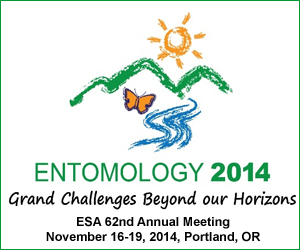Variability of genetic resistance to parasitism in the pea aphid
Variability of genetic resistance to parasitism in the pea aphid
Monday, March 3, 2014: 2:40 PM
Greenbrier (Embassy Suites Greenville Golf & Conference Center)
Natural enemies exert strong evolutionary pressures on the insects they attack, and heritable variation in resistance is required for populations to respond adaptively. Pea aphids (Acyrthosiphon pisum), for example, vary greatly in their resistance to a common natural enemy, the parasitoid, Aphidius ervi. Originally, it was assumed that variation in enemy susceptibility was derived from the aphid genome, but several subsequent studies found that the bulk of variation in resistance was instead acquired by infection with a common heritable bacterial symbiont called Hamiltonella defensa. In an additional twist, however, we recently discovered that some pea aphid clones lacking protective symbionts are highly resistant to parasitism. In this study we examined the susceptibility of numerous pea aphid clonal lines, devoid of facultative symbionts, to attack by the wasp A. ervi. We find substantial variation in resistance owing to aphid genotype. We also conducted fitness assays to determine if there is a tradeoff between resistance to parasitism and aphid fecundity and survival. Surprisingly, we found no correlation between resistance and these fitness parameters. Understanding the sources and amount of variation in enemy resistance is critical to biological control programs, as their success is clearly related to the susceptibility of the target population.
See more of: Ph.D. Student Oral Presentation Competition II
See more of: Student Ten Minute Paper Competition
See more of: Student Ten Minute Paper Competition


